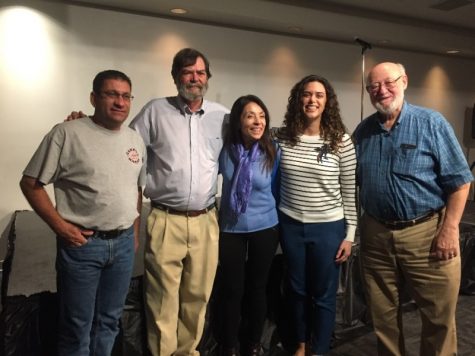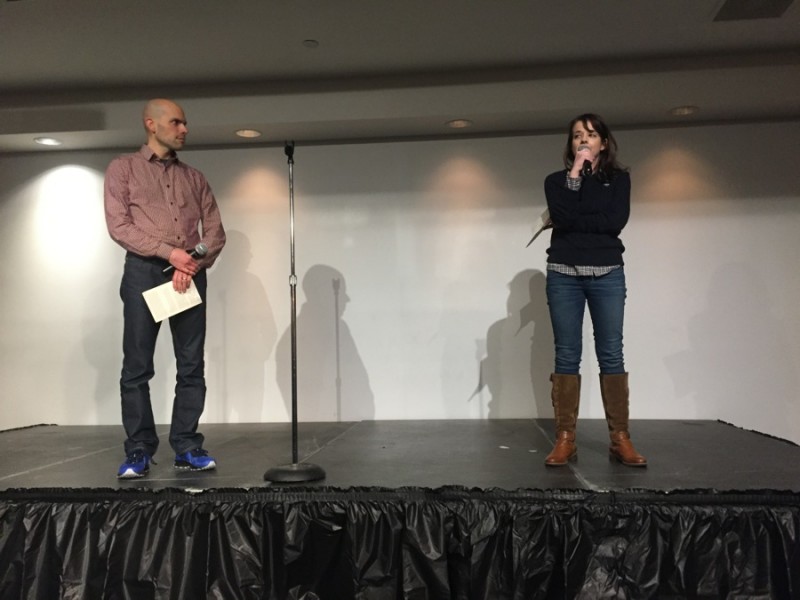Story Collider highlights Deepwater Horizon oil spill
The Story Collider fuses storytelling with pressing scientific topics to inspire audiences, as both a traveling live show and weekly podcast. Five scientists from various disciplines traveled to New Orleans on Monday to speak at the New York-based live storytelling show and podcast, which markets itself as telling “stories about science.” The uniting theme of the stories was the Deepwater Horizon oil spill of April 2010, which devastated the ecosystem of the Gulf of Mexico.
The featured speakers discussed how the oil spill impacted their scientific passions and their personal lives.
“People that come to see a show like this … may not have that implicit interest in science but are happy to come to a storytelling event and along the way learn something about science,” Producer Ari Daniel Shapiro said. “Also, to come to realize that scientists and people affected by science are real … they have emotion, they have drama, just like we all do.”
Story Collider was developed in 2010 by two physicists who were inspired after attending a storytelling show in Queens, New York. It has regular live shows in Boston and New York.
After the 2010 spill, 11 individuals went missing and were never found, and oil conglomerate British Petroleum paid $18.7 billion in fines. Story Collider panelists spoke about these consequences and the lasting effects that the spill had on the city, both emotionally and economically.
Robert Campo owns the 117-year-old, family-owned Campo’s Marina in Shell Beach, Louisiana. The business is centered around oyster and shrimp fishing off the coast of Louisiana. At the event, Campo described the ways the spill affected marine life, speaking about the massive volumes of dead sea life – a threat to his livelihood.
“I couldn’t see myself doing anything else but fishing for a living,” Campo said. “I don’t know what I’d do without being on the bayous every day. It’s hard to think, it’s hard to process that you might have to go do something else.”
Estelle Robichaux, a native Louisianan and senior restoration project analyst for the Environmental Defense Fund, said she was devastated when she learned of the spill.
“I read a story about how the oil was moving closer and closer to Louisiana’s coastline,” Robichaux said. “I just couldn’t wrap my head around the idea that my homeland might be on the verge of possible destruction – that the places where my heart lies, those beautiful wetlands that shaped who I am and what I do so strongly, might cease to exist.”
Robichaux learned that news outlets were reporting that the spill was likely the largest in U.S. history and even the world.
“Every time I brought up news about the oil spill, I could read some, but eventually that sick feeling, and sometimes chest feelings and feeling like you couldn’t breathe – feelings that I realized were minor panic attacks – would just take over,” Robichaux said.
Charlie Henry, director of National Oceanic and Atmospheric Administration’s Disaster Response Center, had been chasing oil spills for some 25 years when the 2010 spill occurred, yet he still found himself and his team challenged.
“One of the real challenges with the Deepwater was that often we would have much better information within the first few hours, but tragically, those that really knew what was going on actually perished in that explosion,” Henry said.
Henry cited uncertainty and lack of control as particularly difficult aspects of his job.
“One of the things you learn about in emergency response is, as a scientist, you’re always trying to learn something each incident,” Henry said. “They’re often unplanned and uncontrolled scientific experiments … You’re trying to connect with the public and ensure the safety of responders and protect the environment, but you have a lot of limitations on what you can do.”
With the speakers’ varying levels of direct involvement and emotional investment in the oil spill, a strong tie at the Story Collider event was the storytellers’ continuing and powerful passions for their respective scientific fields.
“I can tell you that the Louisiana fisherman [are] a very proud people,” Campo said. “They are hardworking, they endure what most people wouldn’t even go outside in. At the end of the day, what makes me do what I do is because Louisiana is home.”
Robichaux and her colleagues celebrated a victory upon the announcement of the global settlement with BP in the summer of 2015 when the fine amounts were determined. Funding would come to their organization to begin coastal restoration efforts after years of waiting.
“Having this money by no means meant that our work was done,” Robichaux said. “It meant that our work had hardly even begun. When we had that certainty … we were empowered … For me, that empowerment after years of grieving for the Gulf and my beautiful Louisiana homeland, that knowledge gave me hope.”

Your donation will support the student journalists of Tulane University. Your contribution will allow us to purchase equipment and cover our annual website hosting costs.




Leave a Comment